We’re not all lucky enough to have perfectly behaved dogs. But that doesn’t mean your pup should never leave home! In fact, traveling together is a great way to build your reactive dog’s skills and your confidence.
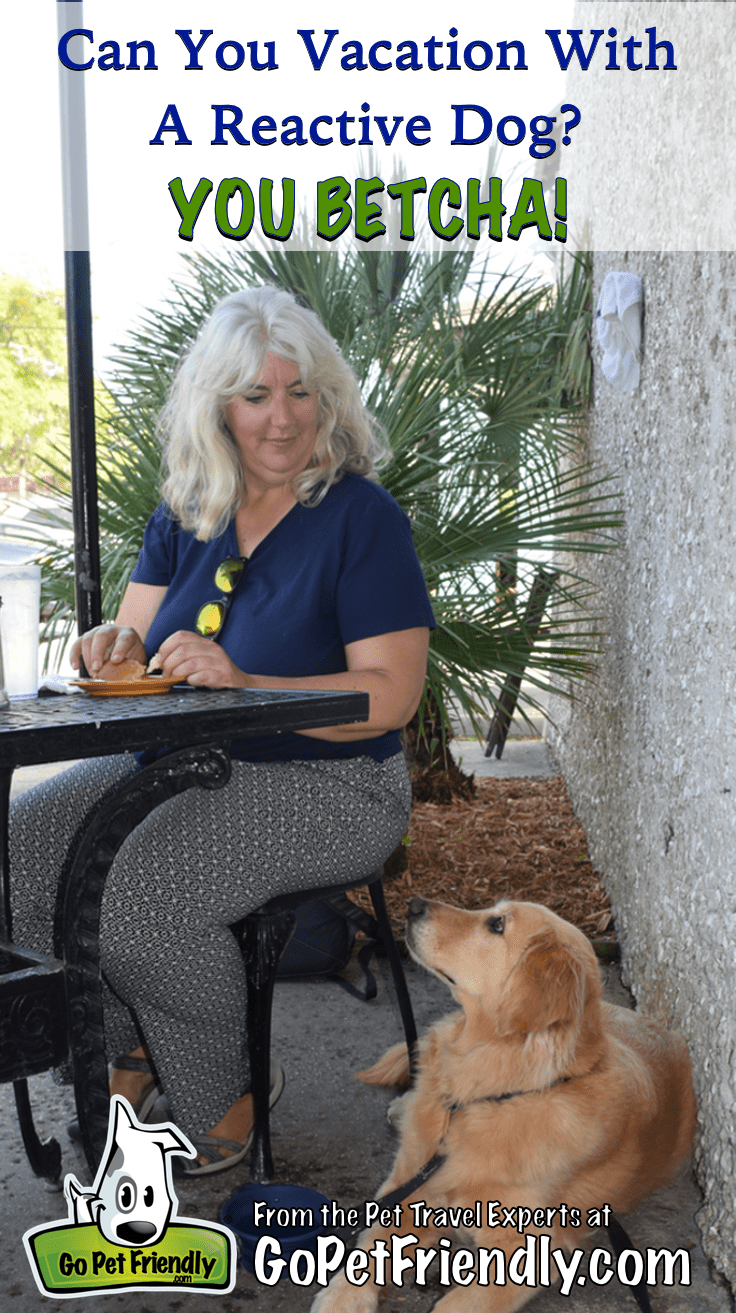
Dogs have all kinds of behavioral challenges. Some dogs bark too much. Others haven’t mastered the art of greeting people or other dogs politely. And some are reactive. If your dog isn’t perfectly behaved, should you forgo vacations together? We think not! With these management tips, traveling with a reactive dog can be fun for you both.
Understanding Your Reactive Dog
For ten years we traveled full-time with a dog who was leash reactive. When approached by other dogs, he barked and lunged and generally acted like a deranged lunatic. Being out in public wasn’t always easy, but it allowed all of us to grow. We encountered endless training opportunities, built our confidence, and deepened our bonds.
What is a Reactive Dog?
Calling a dog “reactive” is a nonjudgmental way to describe a dog’s behavior in certain situations. It simply means that the dog has a strong negative reaction to particular triggers.
Some dogs dislike strangers. Others fear dogs. My friend’s dog becomes a fuzzy little psychopath when he spots a man with a beard. And not all reactive dogs are fearful – some become over-excited in the presence of specific trigger.
If your dog barks or lunges on leash when another dog or stranger walks by, you might have a reactive dog.
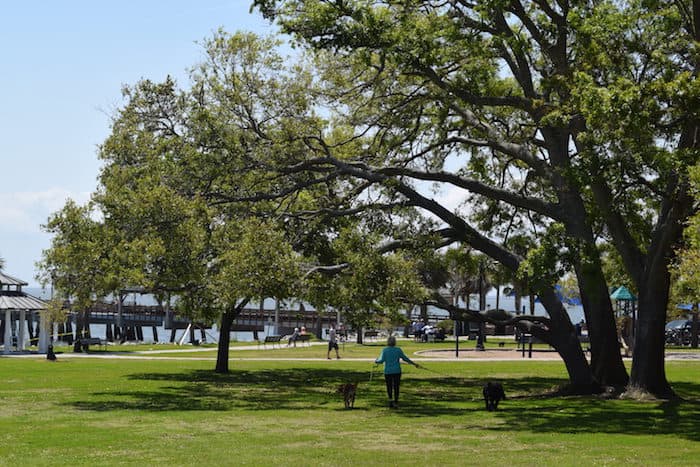
Desensitization Training
Training can help your dog’s reactivity, and you’ll definitely want to start working with your dog to decrease her reactions. Start by identifying your dog’s triggers and then begin desensitizing your dog to those situations.
How does it work?
We helped our dog, who was reactive to other dogs, by creating a game we called, “Where’s The Doggy.”
Start by finding a place where your dog can notice his triggers, but has enough space from them that he doesn’t get upset. We found a spot overlooking a trail frequented by people walking their dogs.
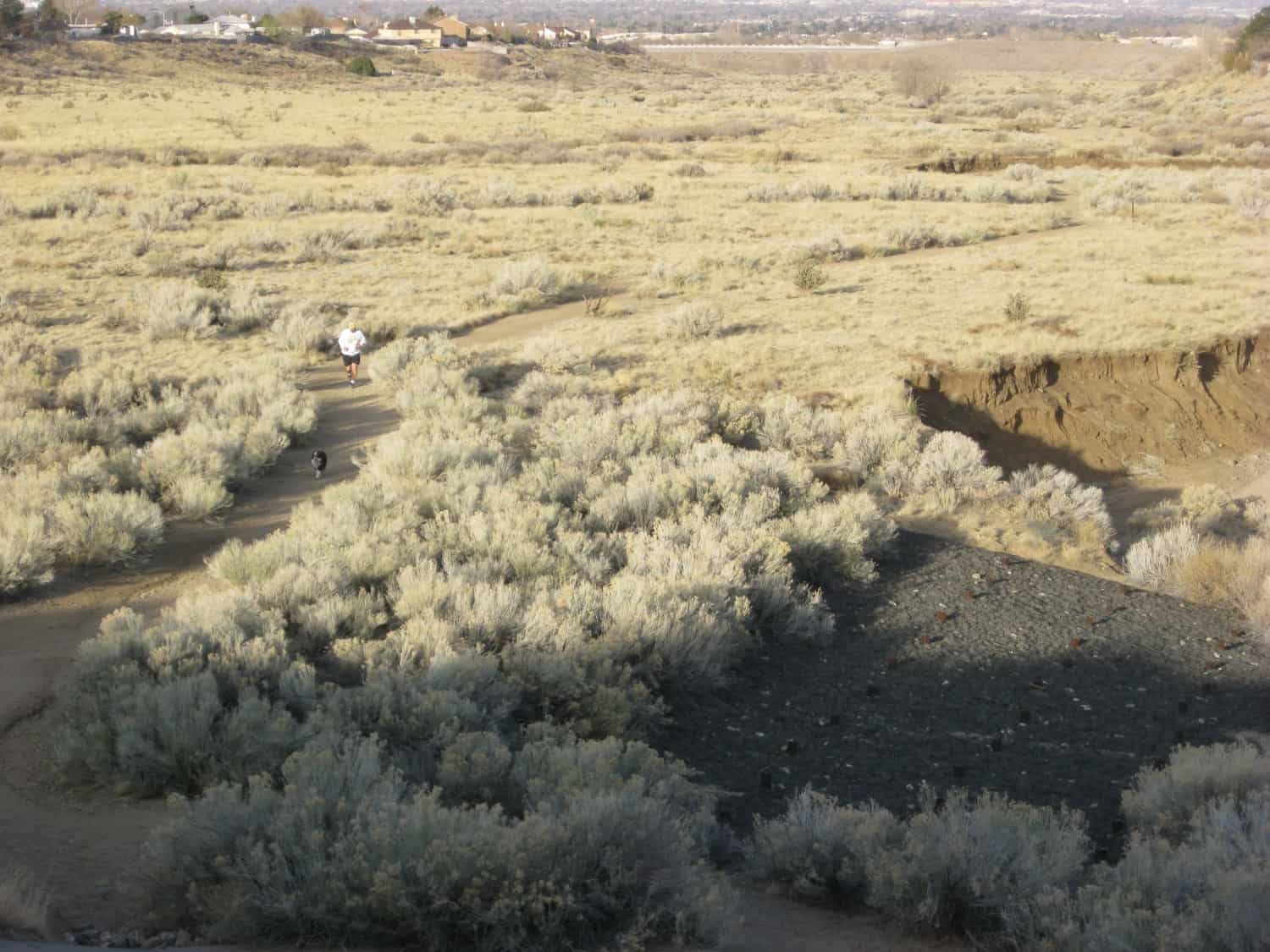
When we saw another dog coming down the path, we said, “Where’s the doggy?” Then we waited for him to spot the other dog. The moment he did we said “YES!” and gave him a treat to build a positive association. We repeated this until the other dog was out of sight.
Once our dog learned the game, he began looking at us for a treat whenever he spotted other dogs. And eventually he could tolerate being closer to other dogs without reacting.
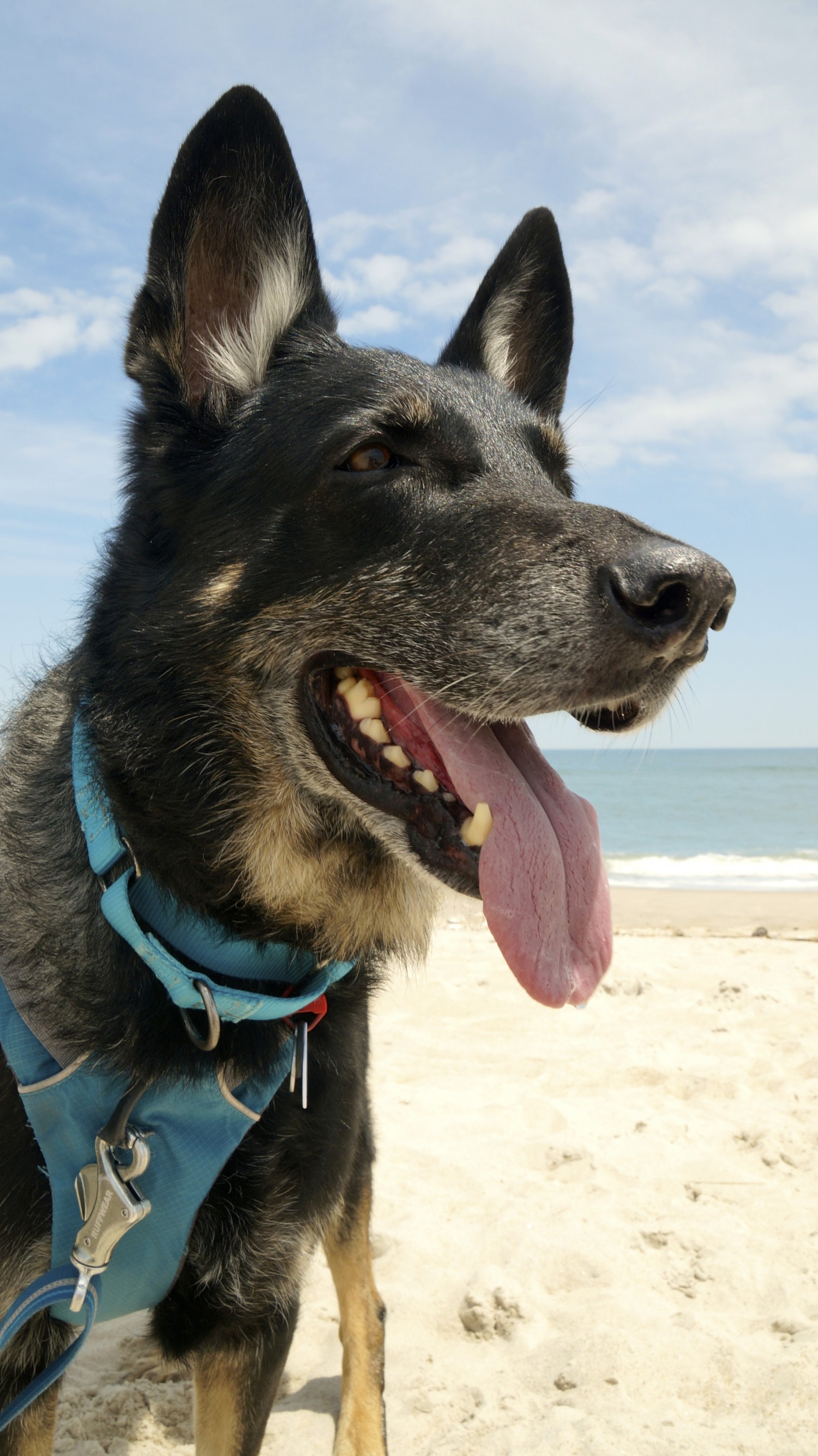
Traveling With A Reactive Dog
Desensitization is a slow process. While you’re working on it you’ll want to do your best to manage your dog’s encounters so he doesn’t have the opportunity to practice his reactive behavior. For most of us, management is the key to traveling with a reactive dog.
The first step to traveling with a reactive dog is to set him up for success. Large, noisy cities or crowded dog beaches could be too much for a dog who is just learning to control his reactions.
Choose Your Destination Carefully
We used to regularly visit the seaside town of Cape May, New Jersey with our reactive dog. While it doesn’t compare to the famously pet friendly beaches in San Diego, Cape May had plenty of pet friendly activities. And it wasn’t overrun by people visiting with their dogs!
When you’re researching where to go, choose a spot that has some pet friendly amenities, but isn’t likely to overwhelm your dog. You’ll have an easier time managing your dog’s reactions if you choose a place where he’s less likely to encounter his triggers.
READ MORE ⇒ Visiting San Diego With Less-Social Dogs
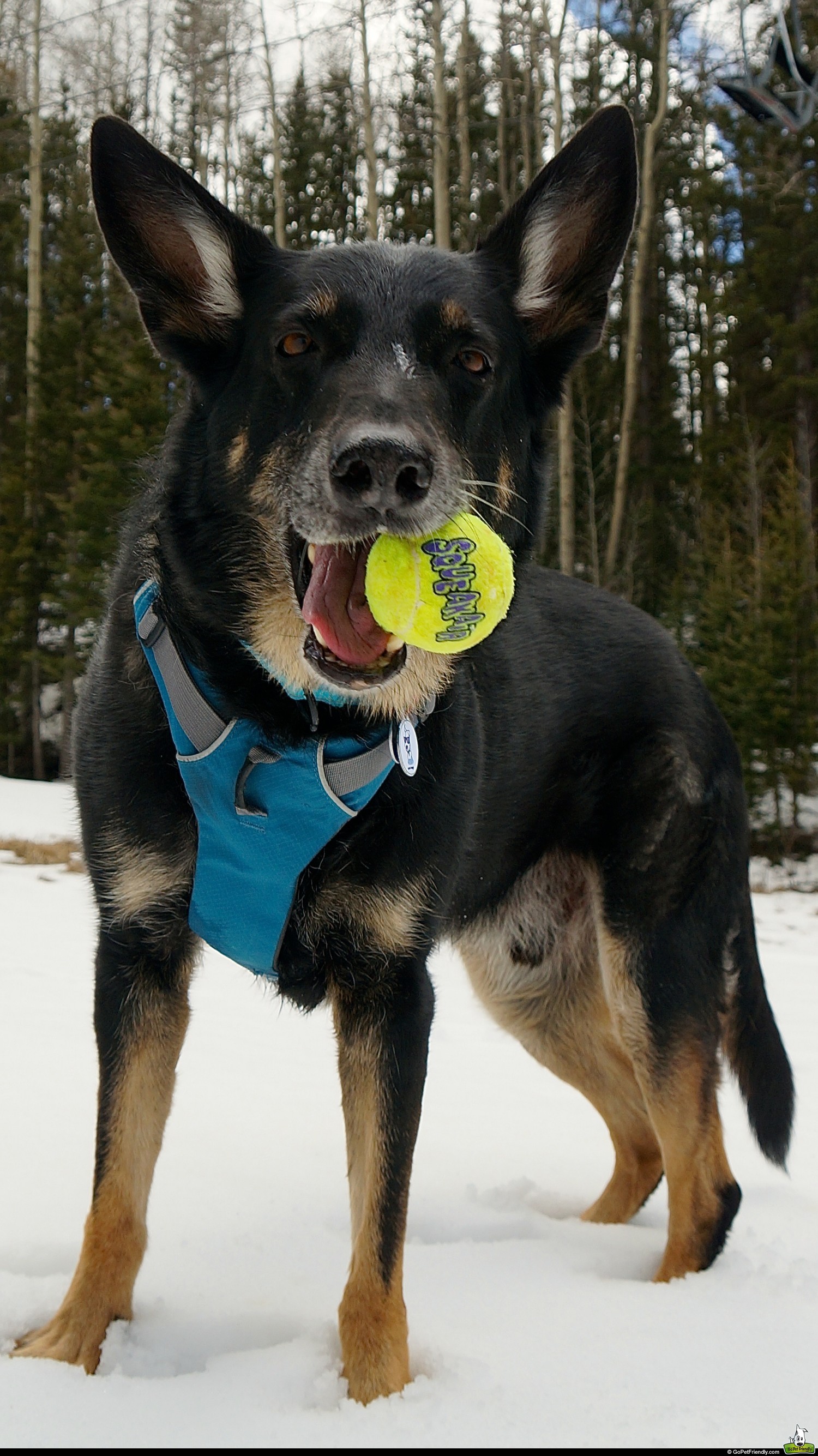
Travel During Shoulder Season
Of course Cape Cod is lovely in the summer. And Key West is a treat in December. But if you’re vacationing with a reactive dog, plan your trip during shoulder season—that period right before or after the rush of tourists.
You and your dog will find it much easier to enjoy your vacation without the mobs of people who think the best time to take a vacation is when everyone else does.
During the shoulder season, many resorts and restaurants are open and rentals are available at the off-season pricing. But best of all for your dog, there is less cause to react.
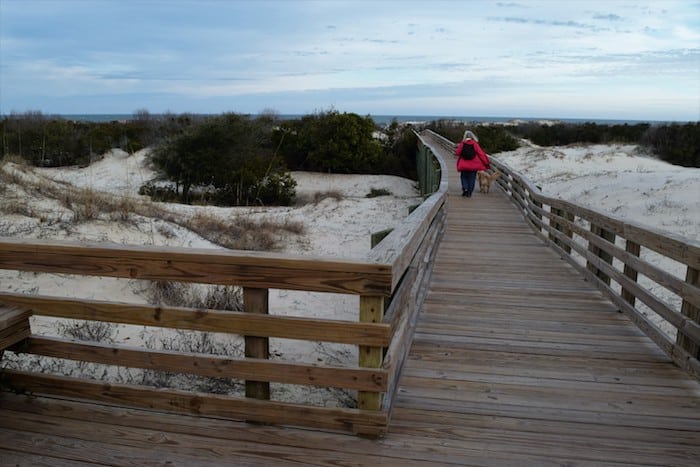
Consider A Vacation Rental
Many dogs feel anxious when they hear loud voices in a hotel hallway or the racket of a nearby ice machine. For a reactive dog, the routine noises of a busy hotel can be too much to bear.
So why not rent a vacation house of your own?
It’s easier than ever to find pet friendly rental properties, and there offer several advantages over hotels. Renting a pet friendly house for a week is usually less expensive than staying at a hotel or inn. You can save even more money by preparing some of your meals instead of eating out. And you could have the option to hanging out together in the back yard or on the deck!
READ MORE ⇒ Tips For Booking A Pet Friendly Vacation Rental
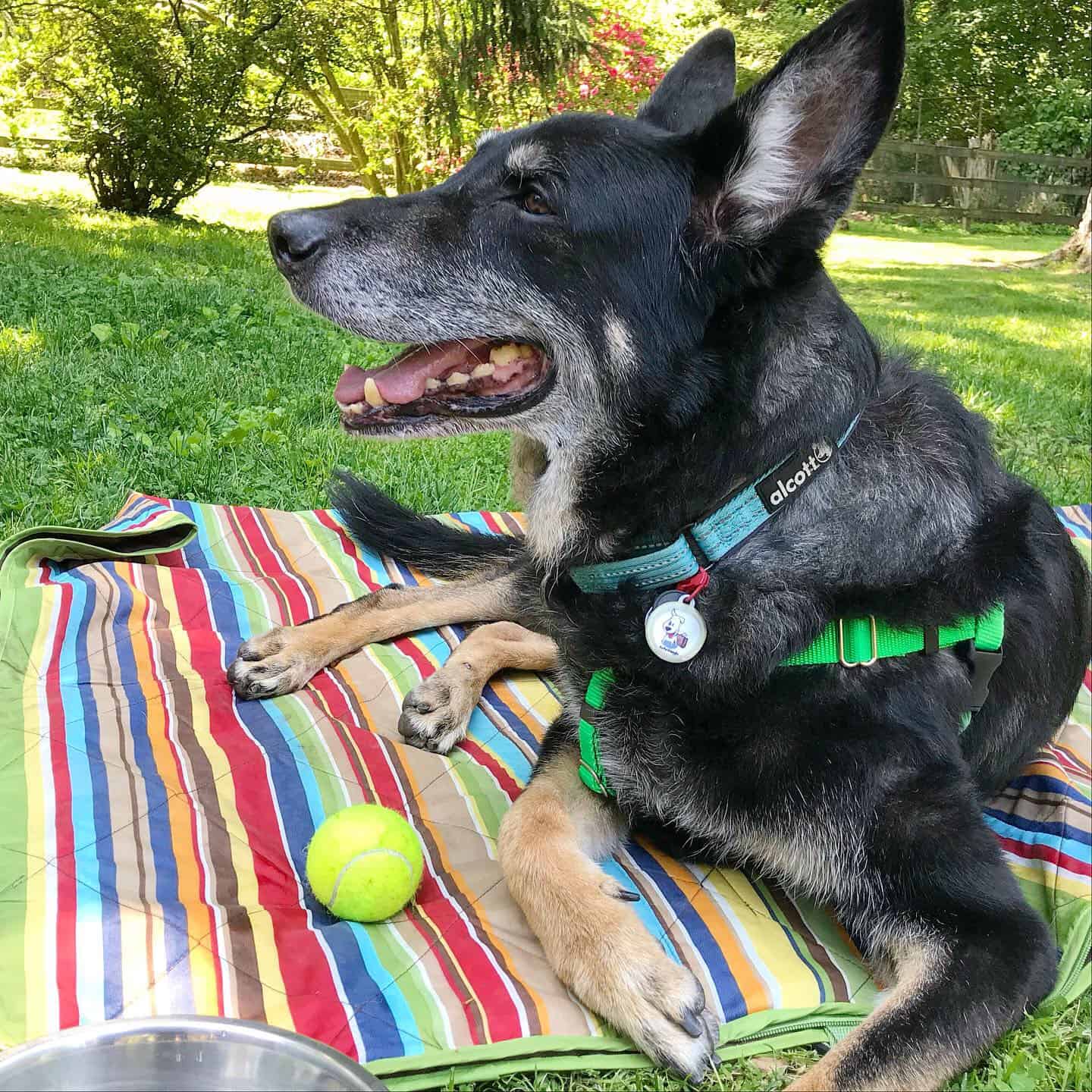
Most importantly, your reactive dog will probably feel more comfortable in a quiet house. And you’ll feel more secure if you need to leave your dog behind for short periods of time while you do things that aren’t pet friendly.
If your pup also feels anxious when being left alone, or you don’t know how he’ll react to the new setting, try bringing a few supplies with you. A baby gate, crate, or whatever you use to keep your dog comfortably confined at home, his bed, and a few familiar toys can help him settle in more quickly.
Try Camping
Camping is another great option when traveling with a reactive dog, and it’s gotten easier for newbies to try out.
You can rent pet friendly RVs or campers vans. Some U.S. state parks have pet friendly lodges and cabins. Many private campgrounds offer pet friendly cottages. And outdoor clubs rent tents and sleeping bags if you don’t want to invest a lot of money so find out if you like sleeping on the ground.
Whether you and your pup are more rugged or prefer “glamping,” you’ll find accommodations that will be fun and give your dog a reprieve from crowds. Squirrels, of course, are another matter!
READ MORE ⇒ Camping With Dogs – A Beginner’s Guide
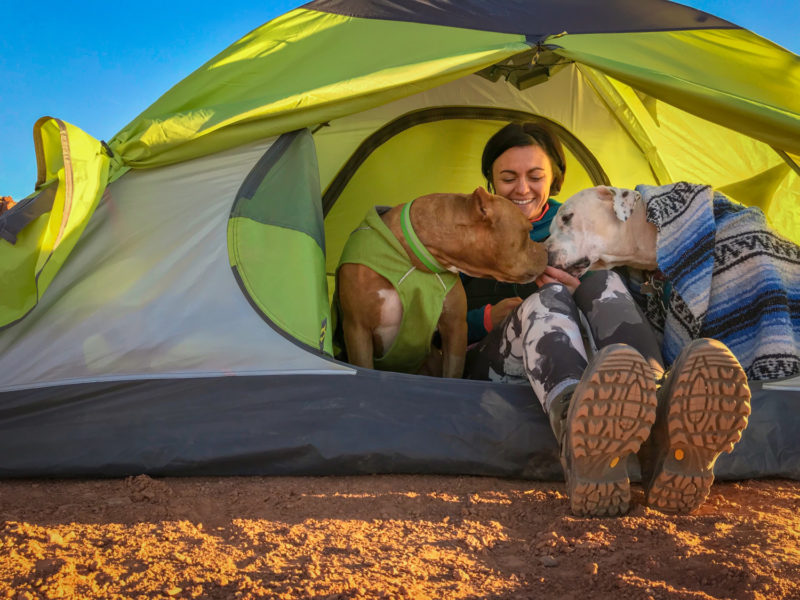
Schedule Dog Friendly Activities for Weekdays
Even if you vacation during the shoulder season, you’ll find crowds increase on weekends. People come on day trips and more dogs will be hanging out with their people.
But on the weekdays, you’ll have the beaches, trails, sidewalks, dog parks, and pet friendly restaurants all to yourselves.
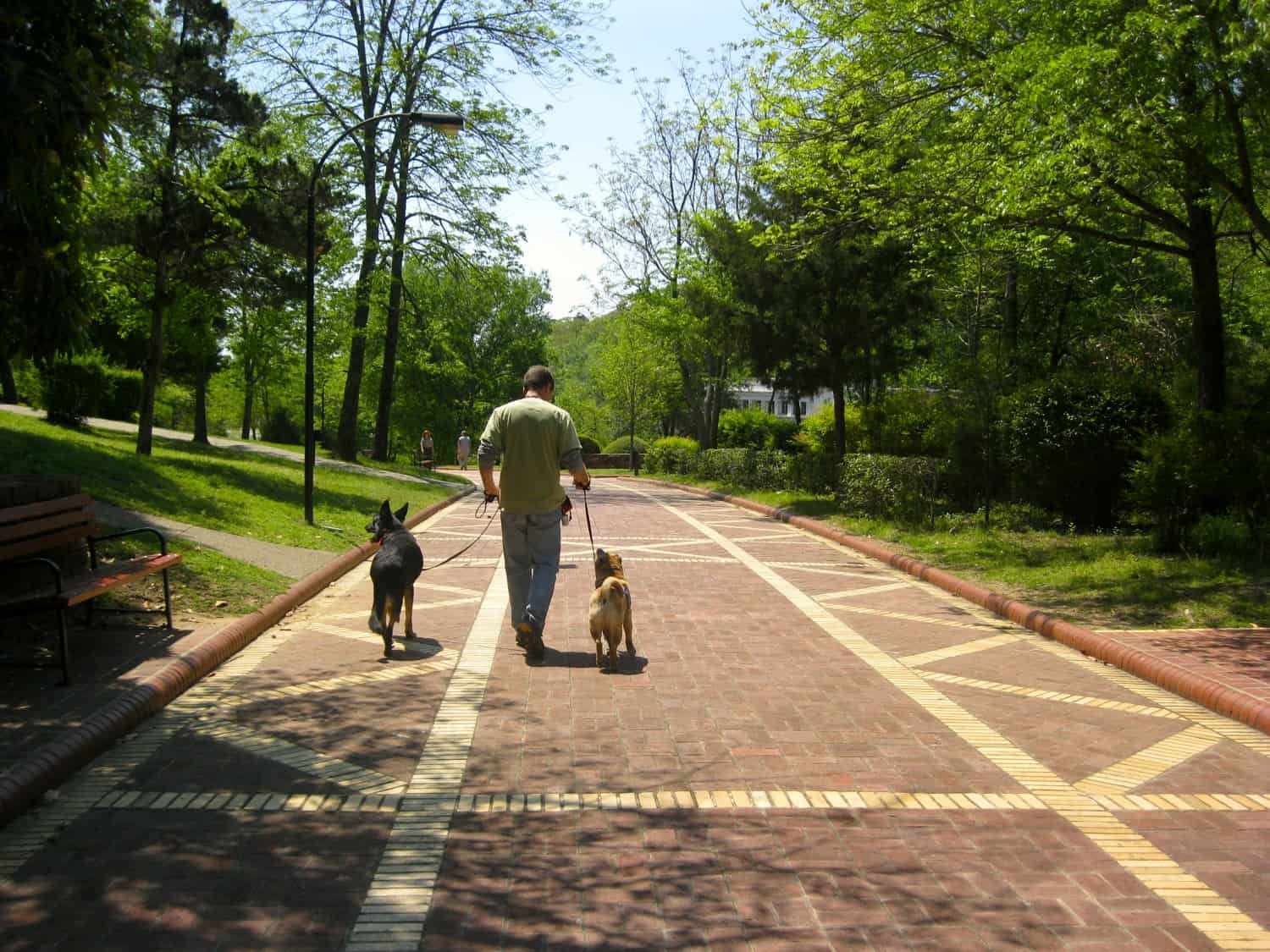
If it’s not possible to plan your outings for weekdays, try these strategies to keep your dog’s encounters to a minimum:
Walk early and late. Getting out while everyone is asleep is one way to ensure you don’t meet a lot of people and dogs on your walks. Sure, it means you might need a nap in the afternoon. I imagine your dog will be happy to curl up with you.
Get off the beaten path. If there’s a popular spot for dog walking, go the opposite direction. Sniffing out less popular routes will also allow you to explore places few other people see.
ALWAYS carry treats. Redirecting your dog’s attention when he’s faced with something challenging will help him move past his fears. We use a treat pouch, and where the dog goes, the treats go!
Skip obvious instigators. Farmer’s markets. Festivals. Off-leash dog parks and beaches. As much fun as these things sound, if they’re beyond your dog’s capabilities, it’s best to avoid them.
Plan Ahead When Eating Out
Speaking of pet friendly restaurants, you don’t have to starve just because your dog is reactive! A little training before dining out with your dog goes a long way. We’ve used all the following strategies when dining out with our less-than-social dog:
Eat during off hours – If you dine before or after rush times, your pup will have more room to settle in. We’ve had “linner” at 3:30 and enjoyed entire pet friendly patios by ourselves.
Pick your seat carefully – Even with a perfectly behaved dog, you should choose your restaurant table carefully. The best seats are in the corner where your dog can scoot in around the table and be out of the way of servers and other diners.
READ MORE ⇒ Training Your Dog To Be A Good Dining Companion
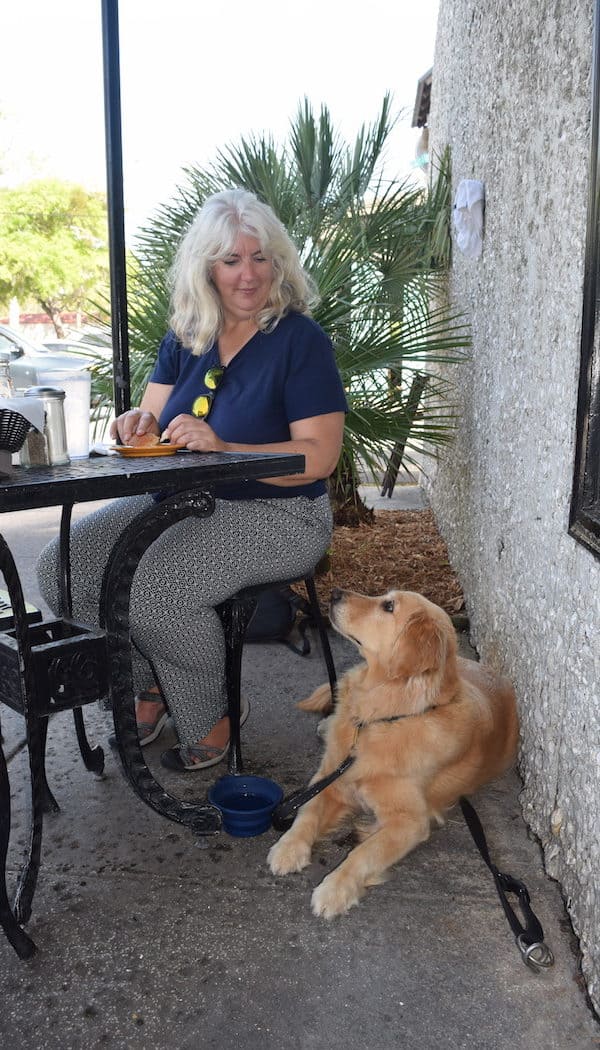
We avoid darling little places that have tiny tables crammed onto a tight patio. As cute as they are, it’s not a good environment for our reactive dog.

Build your dog’s confidence – Pack his dinner into a Kong or other food toy and let him work on it while you’re eating. While enjoying his meal without reacting, he’s learning that being calm in a restaurant brings delicious rewards.
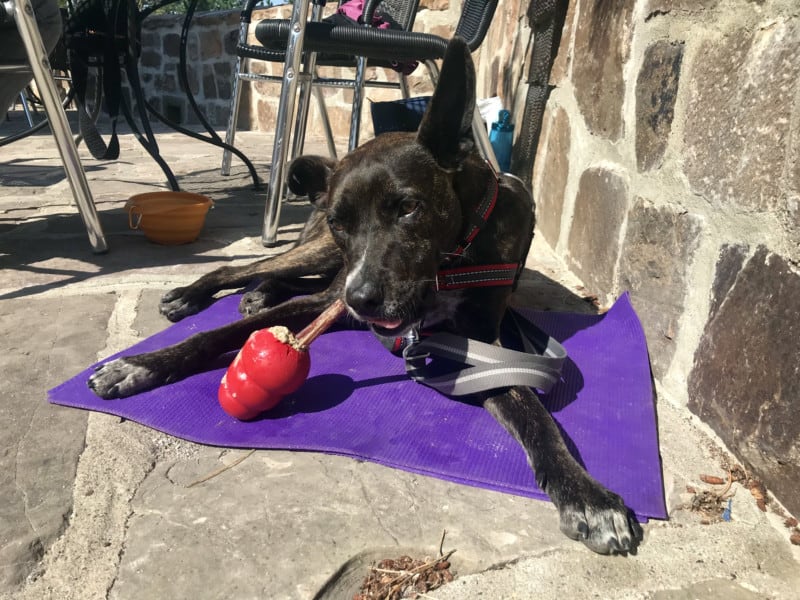
Have an exit strategy – You can’t prepare for everything. Someone could walk by your table with a Yorkie in her purse. Despite your best efforts, if your dog starts to react, leave immediately. Ask a friend to pay the bill, carry enough cash to leave behind, or call the restaurant once your dog has calmed down and settle the bill over the phone.
Dining out if your dog just isn’t ready – Not every dog will be able to sit calmly under a restaurant table. Or maybe you’re just starting to work with your dog on his reactivity. Does that mean you can’t enjoy special meals together?
Absolutely not!
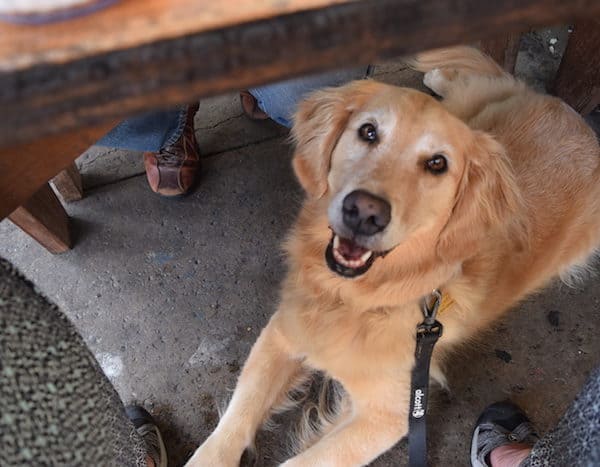
We’ve rented houses with lovely barbecue grills and bought fresh shrimp down on the docks. I swear our meals were more delicious than some I’ve had at restaurants!
I’m also a big fan of picnics. There is no restaurant setting in the world as attractive as a picnic on a rock overlooking a waterfall or at a table in a redwood forest.
And these meals give your dog the opportunity to practice his “eating out” skills without the pressure of being in a crowded place.
Just Do It
If you have a reactive dog, you are always vigilant. You look ahead in all directions for possible “situations.” You worry about off-leash dogs rushing up. And you dread the moments when your dog barks and lunges at strangers who pass.
When you’re always vigilant, it’s easy to miss the signs that your dog’s behavior is improving. Eventually, you must take a chance and let your dog show you what she can do.
The Benefits Of Traveling Together
Having dogs that are the picture of perfection isn’t a requirement to have a great pet friendly trip. In fact, if we all waited until we had perfectly behaved dogs to start traveling, it could take a lifetime!
There’s nothing quite like planing a vacation that considers your dog’s needs and sharing it with him. Most dogs benefit from the time and attention they receive when you’re out and about. And the pride you’ll feel when they succeed at something that was once out of reach is absolutely priceless.
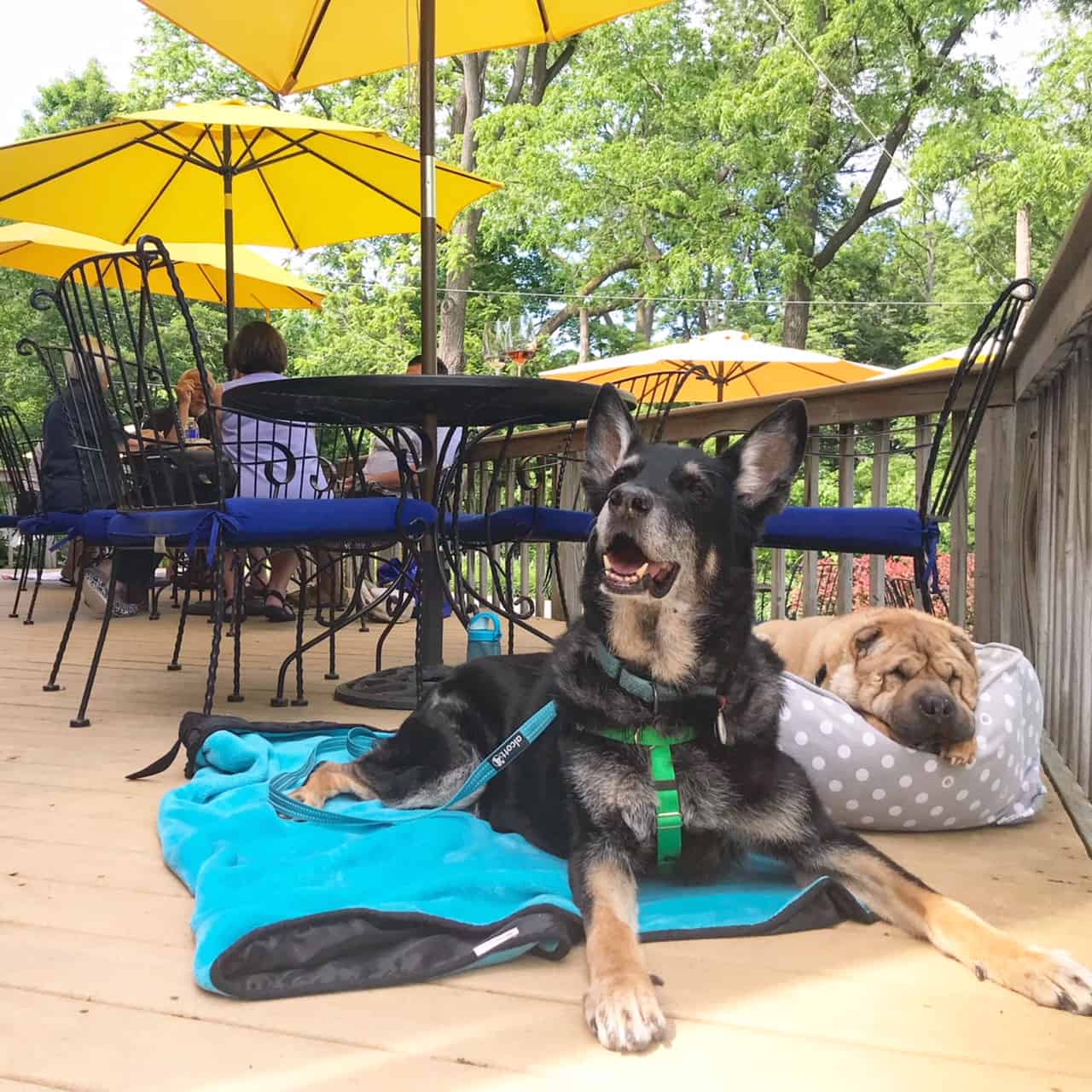
Remember, no dog is perfect. But knowing our dog’s limitations and making accommodations for them goes a long way. With a little planning and a lot of management, traveling with a reactive dog can be fun.
And you might just discover some wonderful destinations you would never have found if you weren’t traveling with a reactive dog!
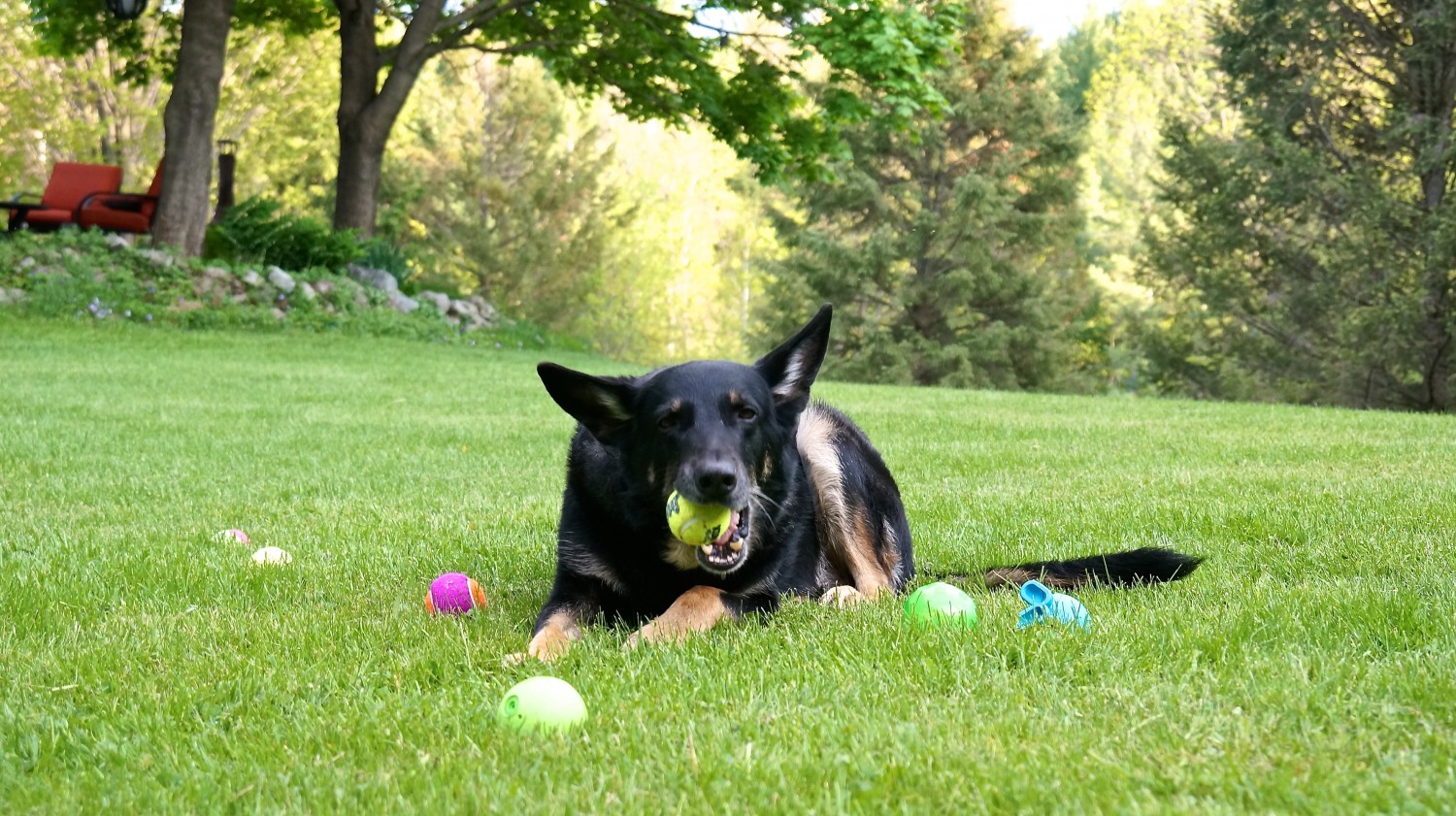
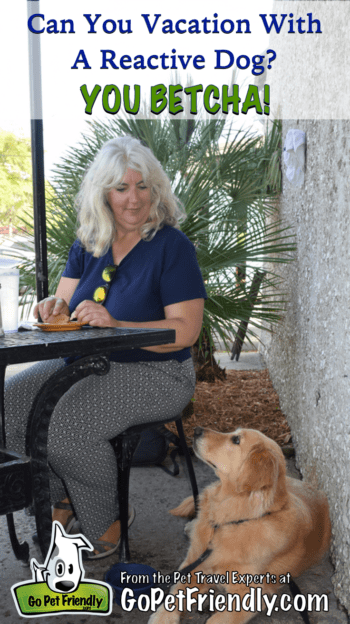
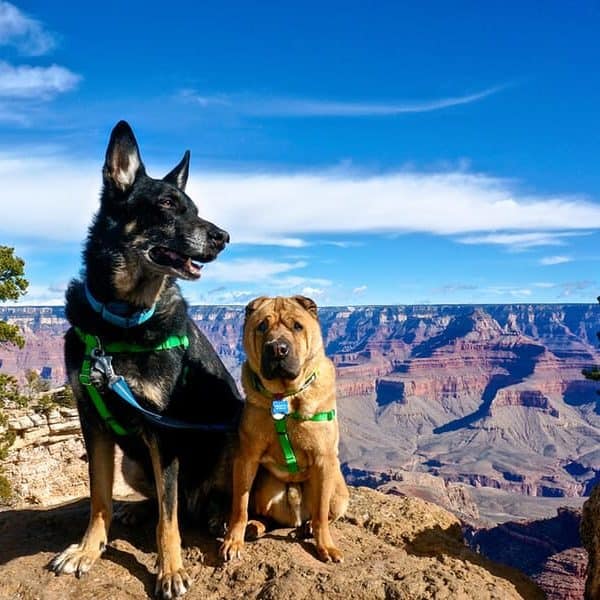
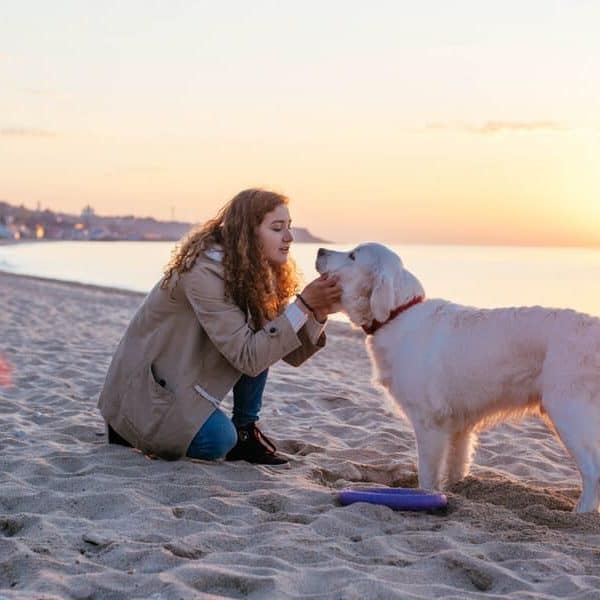
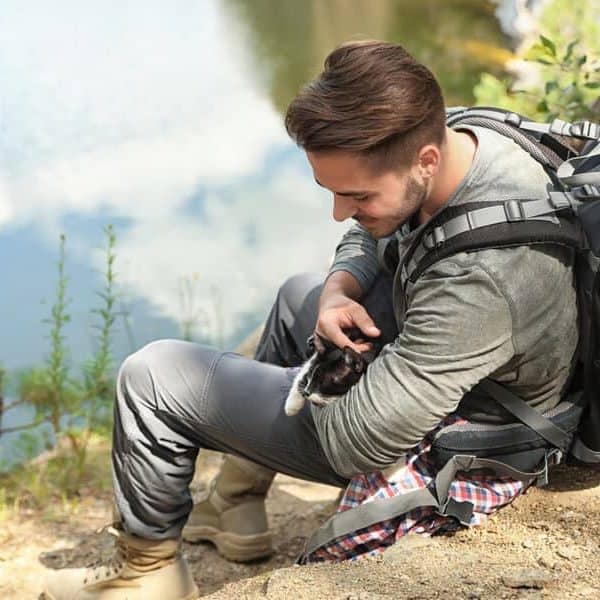
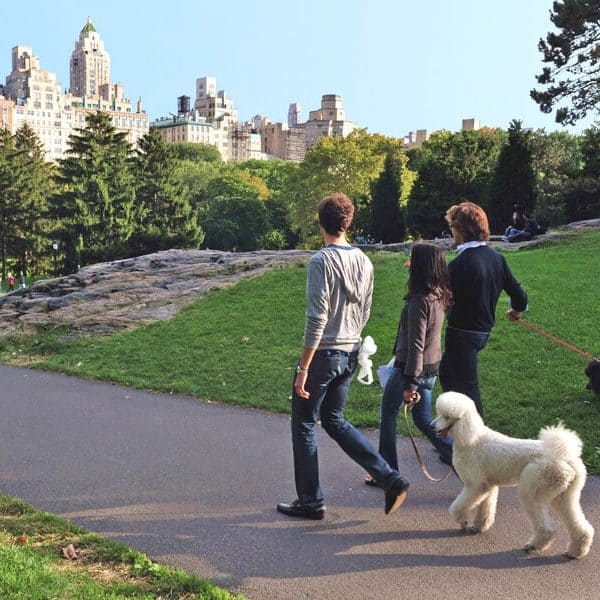
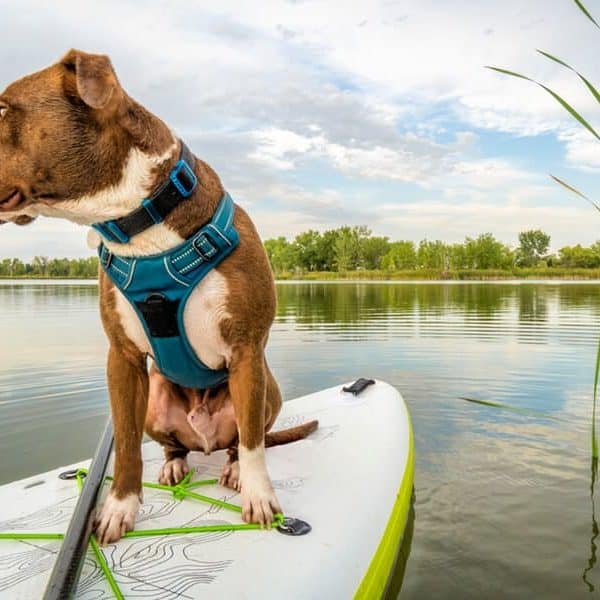
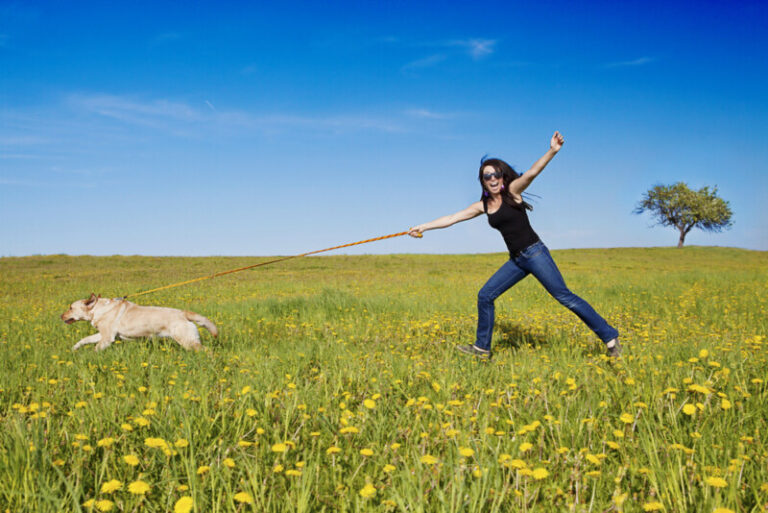
Awesome information thanks
We’re happy to help, Flora. Thanks for your note, and happy travels to you!
I’m so glad I read this. I have a dog who is dog-reactive. I was thinking that maybe I’d skip vacation again. But I feel better this that I have read this.
We’re so glad to help, Raine! Traveling with reactive dogs does mean you’ll have to make some accommodations, but it can be done. And it’s so rewarding for you both! We wish you happy and safe travels.
I got a little choked up while reading this, particularly the part about giving my pup the chance to show how good he can be. Thank you for the encouragement. I want to do some road trips while in between jobs. The reactive nature of my sweet pup is my hesitation. Maybe it doesn’t have to be. Thank you!
Thanks for your note – I’m so happy we could help! Having traveled with reactive dogs for years, I know the feelings of shame and embarrassment when your dog is triggered. It makes you want to avoid any situation that could result in an episode! But, if you can keep in mind that many, many people understand what you’re going through (and you can ignore those who don’t), it helps. The two of you can only do your best, and that will vary depending on the day. So, be patient and kind to yourselves – giving yourself as much grace and empathy as you would someone else working to help their pup! Safe travels!
Thank you so much! This helped me tremendously and will help my girl also :)
Great article
This reading made me hopeful! So many articles dismiss reactive dogs. Thank you for the encouragement and great tips! :)
You’re so welcome, Kali! Thanks for you note. We travelled full-time for 10+ years with our reactive dog, Buster. So, it can definitely be done. Stay patient, manage situations as best you can, and try to recover from any outburst as quickly as you’re hoping your dog will. Good luck and happy travels!
This is so helpful as we’re embarking on a ten day road trip staying at a couple different locations. Thank you so much for the tips! Especially the restaurant ones
You’re so welcome, Lexi! We wish you a wonderful trip.
Overwhelming guilt as I board him with vet or daycare but I still haven’t figured out to do to a road trip and use the bathroom with him.
Hi ID! Thanks for your note. Have you tried stopping to use the restroom (and restock your treat supply) at pet supply stores, like Petco? That way you can always take him in with you. You might find some additional tips in this post on traveling alone with your pet >> https://www.gopetfriendly.com/blog/tips-traveling-alone-pet-dog-cat/
Safe travels!
Hi,
We have a Romanian rescue gorgeous boy who is extremely reactive, to everything. We are looking to go away for a few nights with our sons, somewhere near the Forest of Dean if possible, but we are struggling to find a secluded cottage or similar to rent?
Do you have any suggestions please?
He is great in the house very clean and has no issues at all, it’s just when he see’s anyone, any animal etc.
Hi Shirley! Thanks for your note. Unfortunately, GoPetFriendly operates only in the U.S. and Canada and I’m not familiar with lodging options in the U.K. I sorry I can’t help and I hope you’re able to find accommodations that meet your needs. Good luck!
Bailey has always been reactive, more so as he got older. We learned pretty quickly to rent a cottage rather than a hotel room. Even though we would never leave him alone, he barked at every noise. He is 14 1/2 now and deaf which has helped with his reactions to noises. We can no longer take him places, car rides are too painful on his joints but he still enjoys laying in the sun on our deck!
Awwwwe, sweet boy. I know that you’re enjoying these precious days with him, Doreen. There’s nothing quite like to love of an old dog. Hugs to you both!